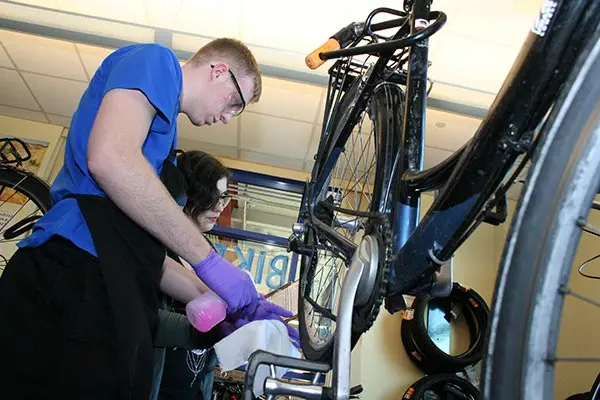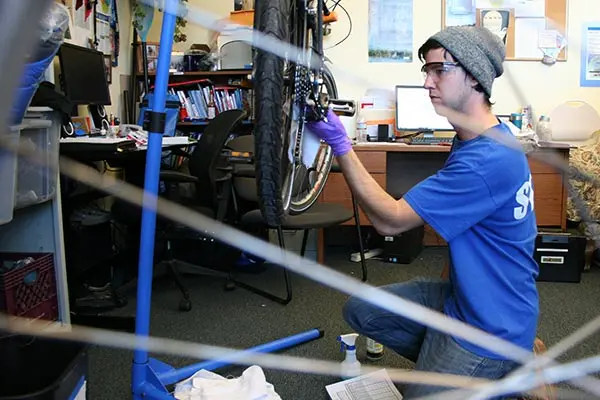Team Evaluates Safer Cleaners and Methods

02/16/2017
By Karen Angelo
Alicia McCarthy needed to dig up dirt for a project.
The public health master’s student, who works as a graduate assistant in the Toxics Use Reduction (TURI) laboratory, found what she needed from the university’s bike shop.
The TURI Lab, which tests the performance of safer cleaners for companies, received a request from Troy Corporation to evaluate its bike cleaning product line.
“We realized that we had a great opportunity to reach out to the campus bike shop to see if they would be willing to let us test some of the Troy cleaners on dirty bike parts,” says McCarthy.
Kevin Soleil, assistant director of the outdoor and bike program, welcomed McCarthy and other students on the team into the shop to do the testing.
“The students were very professional and helpful,” says Soleil. “After they tested the Troy products, they helped us examine our own cleaners and processes. As a result, the bike shop has adopted cleaning products that are safer for the environment and workers. What’s more, we have cut back on the amount of cleansers we use while still thoroughly cleaning the bikes.”
About 10 students participated in the project, testing cleaning products on bike parts such as chains, gears and brakes.

“The students got us thinking about the products that we use and how we use them,” he says. “Because I took a chemicals and health class last semester, I could understand their thought process. With their help, we took a hard look at everything in the shop. It really opened our eyes to different options.”
While in the shop, McCarthy did what she’s been trained to do as an occupational and environmental hygiene major: She took note of the personal protective equipment, the room design and other factors that could pose a potential occupational hazard.
“The staff was interested in us helping them choose products that could be safer, more cost effective and have equal or greater performance,” says McCarthy.
She gave the staff safer cleaners to try as well as materials safety data sheets that listed the ingredients in each product.
“Everyone in the shop was really excited and engaged in this positive collaboration,” says McCarthy. “Since they are looking to expand their workshop and open a new bike shop, they asked me for recommendations on what they should have in their new space to make it safer and greener.”
Applying Academics to the Real World
Working with the staff in the bike shop opened McCarthy’s eyes to something important: translating what she’s learned in her course work to a shop setting can be challenging.

By working for Jason Marshall, the director of the TURI Lab, McCarthy has gained experience writing case studies, presenting information in public forums and working on safer cleaning projects for industry.
“Alicia has applied what she’s learned in the occupation and environmental hygiene master’s program as well as the skills she’s acquired working in the lab to real-world projects. The end result has helped the university and companies become more sustainable,” says Marshall. “It has been great to watch her flourish in this role.”
Her accomplishments have been recognized by the National Pollution Prevention Roundtable. The organization honored McCarthy and TURI Lab Assistant and chemistry major Abigail Giarrosso with the 2016 Most Valuable Pollution Prevention award. They will receive the award in June at the Massachusetts State House.
When McCarthy graduates in May 2017, she’ll take on a new role as higher education program manager for Beyond Benign, a nonprofit that promotes green chemistry for K-12 and higher education.
